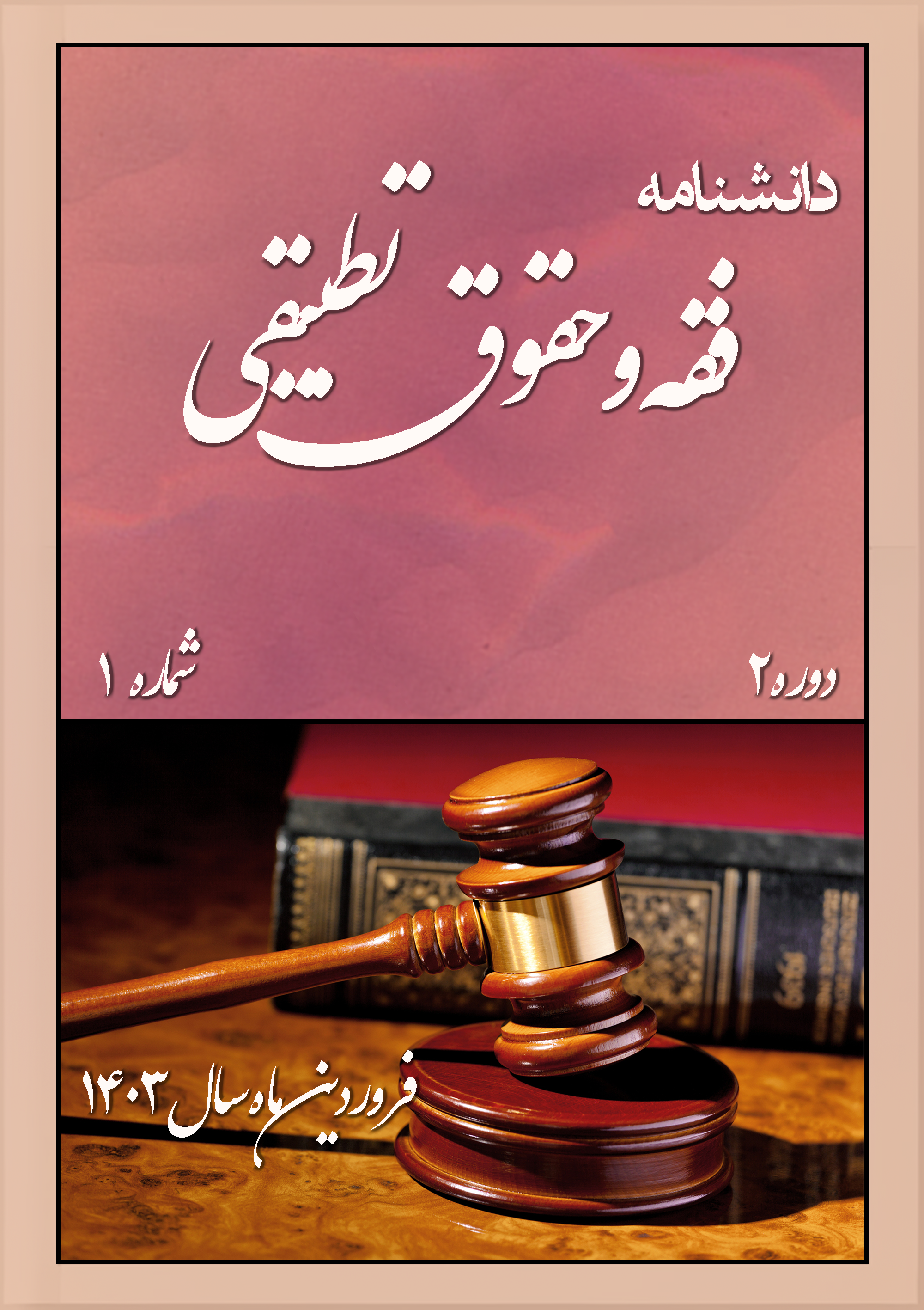Examination of the Punishment of Efsād fi al-Arz in the Crime of Disrupting the Economic System from the Perspective of Criminal Jurisprudence
Keywords:
Punishment, Disturbance in the economic system , Criminal jurisprudence , DisruptorAbstract
Among the most essential human needs throughout life are financial needs. Without considering such needs, life cannot endure. This has caused human beings throughout history to devote the utmost effort and diligence to economic activities. Islam has affirmed these activities with great clarity, referring to them as a form of sacred struggle. In Islamic teachings, the ultimate aim of economic activity is attaining closeness to God and seeking His pleasure. In this regard, the well-being of the family, the individual, and society is oriented toward social justice and genuine equity. This study, using a descriptive-analytical method and relying on Islamic jurisprudential sources, seeks to examine the foundations of disrupting the economic system from the perspective of Islamic jurisprudence. In the Holy Qur’an, the notion of mufsid fi al-arz (one who spreads corruption on earth) is mentioned repeatedly; however, it has not explicitly been designated as the subject of a specific criminal sanction. In this study, using a descriptive-analytical approach, we examine efsād fi al-arz as the punishment assigned to the crime of disrupting the economic system in Islamic jurisprudential sources, given that Iranian law is derived from jurisprudence and its basis and foundation lie in Islamic teachings, which is reflected in legislation. The aim of this research is to determine whether, according to jurisprudential texts, there is proportionality between the committed act, the criminal designation assigned to it, and the punishment prescribed. Criminalizing efsād fi al-arz as an offense independent from mohārebeh (armed rebellion) and prescribing the death penalty for it appears to be somewhat illogical within criminal law, because first, the term efsād fi al-arz has not been independently discussed in classical jurisprudential texts, and jurists have addressed it under the category of mohārebeh. Moreover, the argument asserting that there must be a necessary correspondence between the establishment of Sharīʿa rulings and their explicit designation in the wording of jurists is not compelling.
Downloads
References
Abdollahi, A. (2011). The Attitude of Students and Professors of Shahid Beheshti University Towards the Death Penalty. Social Welfare Scientific-Research Quarterly(42).
Ahravi, S. M. (1997). What is Muḥārabah? Who is a Muḥārib? Fiqh Ahl al-Bayt Journal(11 & 12).
Āmili, H. M. i. H. (1988). Means of the Shi'a (Vol. 2).
Ansari, M. i. M. A. (2001). Gems of Principles (Vol. 2).
Asadi, A., Sedighian, A. M., & Zare' Mehrjerdi, A. (2022). The Effects of Extending 'Corruption on Earth' to Economic Crimes with Emphasis on the Specific Characteristics of These Crimes. Private and Criminal Law Research Quarterly, 18(51).
Azarnoush, A. (2010). Contemporary Arabic-Persian Dictionary. In
Borhani, M. (2015). Corruption on Earth : Conceptual Ambiguity, Practical Corruption (Legal Analysis of Article 286 of the Islamic Penal Code). Journal of Criminal Law and Criminology Studies(2 & 3), 19-44.
Bunic, D. (2010). Criminalistique economique (Vol. 1). ed, je publie.
Eini Najaf Abadi, M. (1993). The Basis and Nature of Ta'zīr
Farahidi, A. a.-K. i. A. (1988). The Source. In
Fayḍ Kashani, M. M. (1995). The Pure Exegesis (Vol. 1).
Fazel Lankarani, M. (2001). Detailing the Shari'ah: Book of Prescribed Penalties.
Habibzadeh, M. J. f. (2000). Investigating the Crime of Muḥārabah and Efsād fil-Arḍ.
Jamāl al-Dini, F., Sāghiyān, M. M., & Qāsemi, A. (2024). Iran's Criminal Policy Regarding 'Corruption on Earth' in Economic Crimes. Journal of Islamic Jurisprudence and Law Studies, 16(35), 333-380.
Khomeini, R. (2008). The Liberation of the Means.
Kulayni, M. i. Y. q. (1987). Branches of Al-Kāfī (Vol. 5).
Langseth, P. (2008). Global Programs to Combat Corruption.
Mahdavi Pour, A. (2013). Differentiated Criminal Policy in the Domain of Economic Crime.
Malloy, R. P. (1991). toward a new discourse of law and economics. Syrecuse law review, 42(27).
Mirmohammad Sadeghi, H. (2001). Reviewing the Status of the Death Penalty in International Law. Islah va Tarbiyat Journal, 7(78).
Mirmohammad Sadeghi, H. (2015). Crimes Against Security.
Musavi, A. (2006). Jurisprudence of Prescribed Penalties and Discretionary Punishments (Vol. 3).
Musavi Bojnourdi, S. M. H. (1901). Jurisprudential Rules (Vol. 1).
Na'nakar, M. (1998). Corruption on Earth in Jurisprudence and Positive Law.
Najafi, M. H. (1988). The Jewels of Speech in Commentary on the Laws of Islam.
Nourzad, M. (2014). Economic Crimes in Iran's Criminal Law.
Ouda, A. Q. (2012). Islamic Criminal Law (Vol. 1).
Qiblah'ī Khū'ī, K. (2010). Verses of Rulings (Civil and Penal Law).
Rahimi, M. M., Manṣūri, S. M., & Khwājeh Pūr, K. (2023). A Jurisprudential and Legal Study of Corruption on Earth and its Instances in Economic Crimes. Economic Jurisprudence Studies, 5(3).
Saki, M. R. (2010). Economic Criminal Law.
Shams al-Din, M. M. (1999). Hoarding in Islam.
Sharifzadeh, M. J. (2012). Law and Economics in Islam.
Shaykh Tusi, M. i. H. The Exegesis of the Clarification (Vol. 3).
Shaykh Tusi, M. i. H. (1980). The Endpoint in Pure Jurisprudence and Rulings.
Tabataba'i, M. H. (1993). The Balance in the Exegesis of the Qur'an (Vol. 2).
Toutounchian, M., & Khazaei, A. R. (2020). Application of Jurisprudential Rules in Economics from the Perspective of the Qur'an. Economic Jurisprudence Studies Quarterly, 2(3).
Tusi, M. i. a.-H. (1987). The Disagreement.
Downloads
Published
Submitted
Revised
Accepted
Issue
Section
License
Copyright (c) 1403 علی خالقی پوستچی (نویسنده); عباس شیخ الاسلامی; مجید شایگان فرد (نویسنده)

This work is licensed under a Creative Commons Attribution-NonCommercial 4.0 International License.










